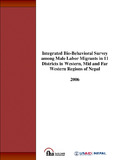Please use this identifier to cite or link to this item:
https://hdl.handle.net/20.500.14356/385Full metadata record
| DC Field | Value | Language |
|---|---|---|
| dc.contributor.author | Family Health International | |
| dc.contributor.author | USAID/Nepal | |
| dc.contributor.author | NEW ERA | |
| dc.date.accessioned | 2013-01-02T21:32:33Z | |
| dc.date.accessioned | 2022-11-08T10:14:38Z | - |
| dc.date.available | 2013-01-02T21:32:33Z | |
| dc.date.available | 2022-11-08T10:14:38Z | - |
| dc.date.issued | 2006 | |
| dc.identifier.uri | http://103.69.126.140:8080/handle/20.500.14356/385 | - |
| dc.description.abstract | Executive Summary: This is the first round of the Integrated Bio-Behavioral Survey (IBBS) conducted among 360 migrant workers in five districts of Kaski, Palpa, Syangja, Kapilbastu and Gulmi in Western development region and another 360 migrants from Banke, Surkhet, Kailali, Kanchanpur, Doti, and Achham districts in Mid-Far Western regions. These districts were selected in consultation with FHI/Nepal and USAID/Nepal, as they have very high concentration of population who migrate for work to India. The IBBS was carried out during the months of March-June, 2006. The survey measured HIV and Syphilis prevalence among migrant workers and variables which are associated with the risk of HIV infection, such as condom use, sexual behaviors, knowledge of HIV/AIDS, reported cases of sexually transmitted infection (STI), STI treatment behaviors, exposure to HIV/AIDS messages and drug habits. | en_US |
| dc.language.iso | en_US | en_US |
| dc.publisher | NEW ERA | en_US |
| dc.subject | Male Labor Migrants | en_US |
| dc.subject | Western, Mid and Far Western Regions | en_US |
| dc.subject | Nepal | en_US |
| dc.title | Integrated Bio-Behavioral Survey among Male Labor Migrants in 11 Districts in Western, Mid and Far Western Regions of Nepal 2006 | en_US |
| dc.type | Technical Report | en_US |
| Appears in Collections: | Post Graduate Grant (PG) Reports | |
Files in This Item:
| File | Description | Size | Format | |
|---|---|---|---|---|
| 493.pdf | Full Text. Download | 398.94 kB | Adobe PDF |  View/Open |
Items in DSpace are protected by copyright, with all rights reserved, unless otherwise indicated.
